
The Delta was a 12-cylinder inverted-V aircraft engine built by Isotta Fraschini prior to and during World War II.
The Bristol Draco was an air-cooled nine-cylinder radial engine from the British manufacturer Bristol Aeroplane Company. It was essentially a version of their famous Pegasus converted to use a fuel injection system.
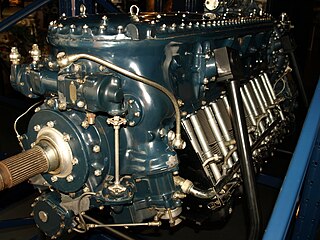
The de Havilland Gipsy Twelve was a British aero engine developed by the de Havilland Engine Company in 1937. Approximately 95 were manufactured. It was known as the Gipsy King in Royal Air Force service.

The Walter Mikron is a four-cylinder, air-cooled, inverted straight engine for aircraft.

The Walter Venus was a seven-cylinder, air-cooled, radial engine for aircraft use, built in Czechoslovakia in the late 1920s.
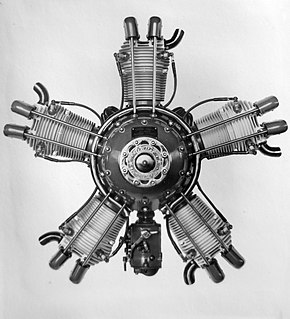
The Walter Vega was a five-cylinder, air-cooled, radial engine for aircraft use, built in Czechoslovakia in the late 1920s.

The Armstrong Siddeley Genet Major is a British five-cylinder, air-cooled, radial engine for aircraft, designed and built by Armstrong Siddeley and first run in 1928. It developed 140 horsepower (104 kW). In Royal Air Force use the seven-cylinder version was known as the Civet I. The Feliform names used are in line with company convention, the Genet and Civet both being large cat-like carnivores.

The Argus As 410 was a German air-cooled inverted V-12 light aircraft engine that was first produced by Argus Motoren in 1938.

The Napier Culverin was a licensed built version of the Junkers Jumo 204 six-cylinder vertically opposed liquid-cooled diesel aircraft engine built by D. Napier & Son. The name is derived from the French word, culverin, for an early cannon or musket. First flown in 1938, the engine went into limited production, with testing carried out on a Blackburn Iris V biplane flying-boat aircraft and Fairey IIIF biplane.
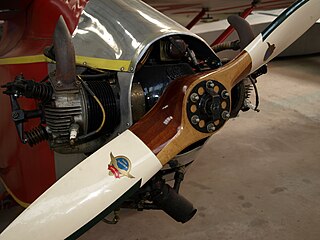
The ABC Scorpion is a 30 hp (22 kW) two-cylinder aero engine designed by British engineer Granville Bradshaw for use in light aircraft. The engine was built by ABC Motors Limited and first ran in 1921.
The Blackburn Cirrus Midget was a British four-cylinder, inverted, inline air-cooled aero engine designed and built in 1937 by the Cirrus Engine Section of Blackburn Aircraft Limited. Little is known of its development and use, its sole aircraft application being reported as the Chilton D.W.1 although it is possible that this did not transpire.
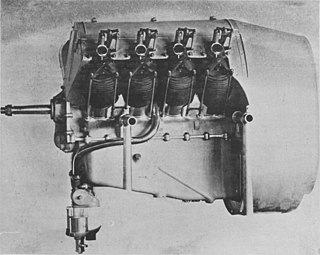
The Renault 70 hp or Type WB was a French V-8 aero engine that first ran circa 1907. It was also manufactured under license by Renault Limited of West Brompton, London between August 1914 and December 1918, three other companies, including Rolls-Royce, also produced the engine. A variant known as the Type WC used an external oil pump as opposed to the internal pump of the Type WB. The Renault V-8 engines were noted as inefficient but reliable, the inefficiency being mainly due to the excessively rich fuel/air mixture used to assist cooling.

The Walter Pollux is a Czechoslovakian nine-cylinder, air-cooled, radial engine, built by Walter Aircraft Engines for powering light aircraft and that first ran in 1936. The engine produces 240 kW (320 hp) at 1,800 rpm.

The Walter Bora was a Czechoslovakian nine-cylinder, air-cooled radial engine for powering light aircraft that was developed in the 1930s by Walter Aircraft Engines.
The Sunbeam Spartan was a British 12-cylinder aero-engine designed and built in 1916.

The Walter Sagitta was a Czechoslovakian, air-cooled, inverted V-12 engine that first ran in 1937. With a displacement of 18.4 litres, it produced up to 373 kW at 2,500 rpm.

The Walter NZ 120 was a nine-cylinder, air-cooled, radial engine for aircraft use built in Czechoslovakia by Walter Aircraft Engines in the 1920s. Using common cylinders and parts from the NZ (Novák-Zeithammer) range of engines the NZ 120 produced up to 135 horsepower (99 kW).

The Walter Junior was a family of four cylinder air cooled horizontally-opposed engines produced by Walter Aircraft Engines in Czechoslovakia in the 1930s for aircraft, characterised by a bore and stroke of 115 mm × 140 mm, a displacement of 5,814 cm3 (354.8 cu in) and producing roughly 78 kW (105 hp).

The Walter Atlas was a nine-cylinder, air-cooled, radial engine for aircraft use built in Czechoslovakia in the early 1930s.
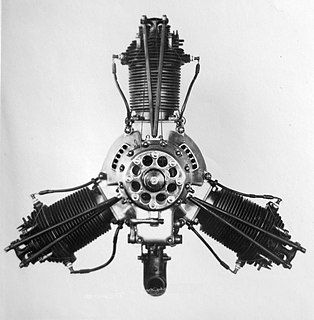
The Walter NZ 40 was an unsuccessful, three-cylinder, air-cooled, radial engine for aircraft use built in Czechoslovakia by Walter Aircraft Engines in the late-1920s.


















